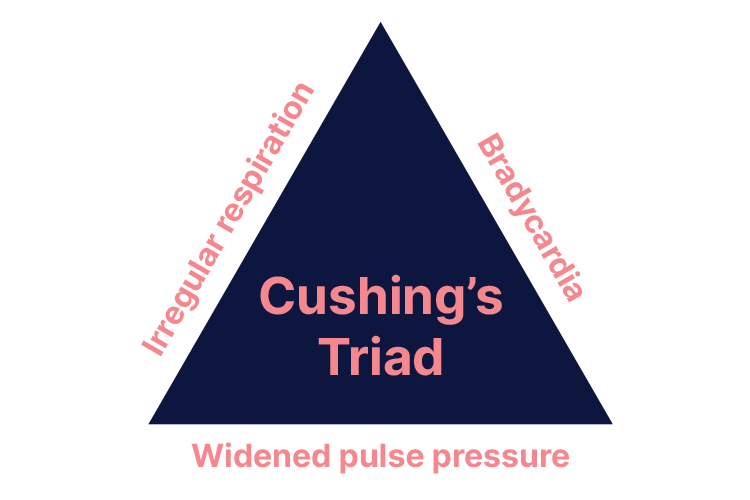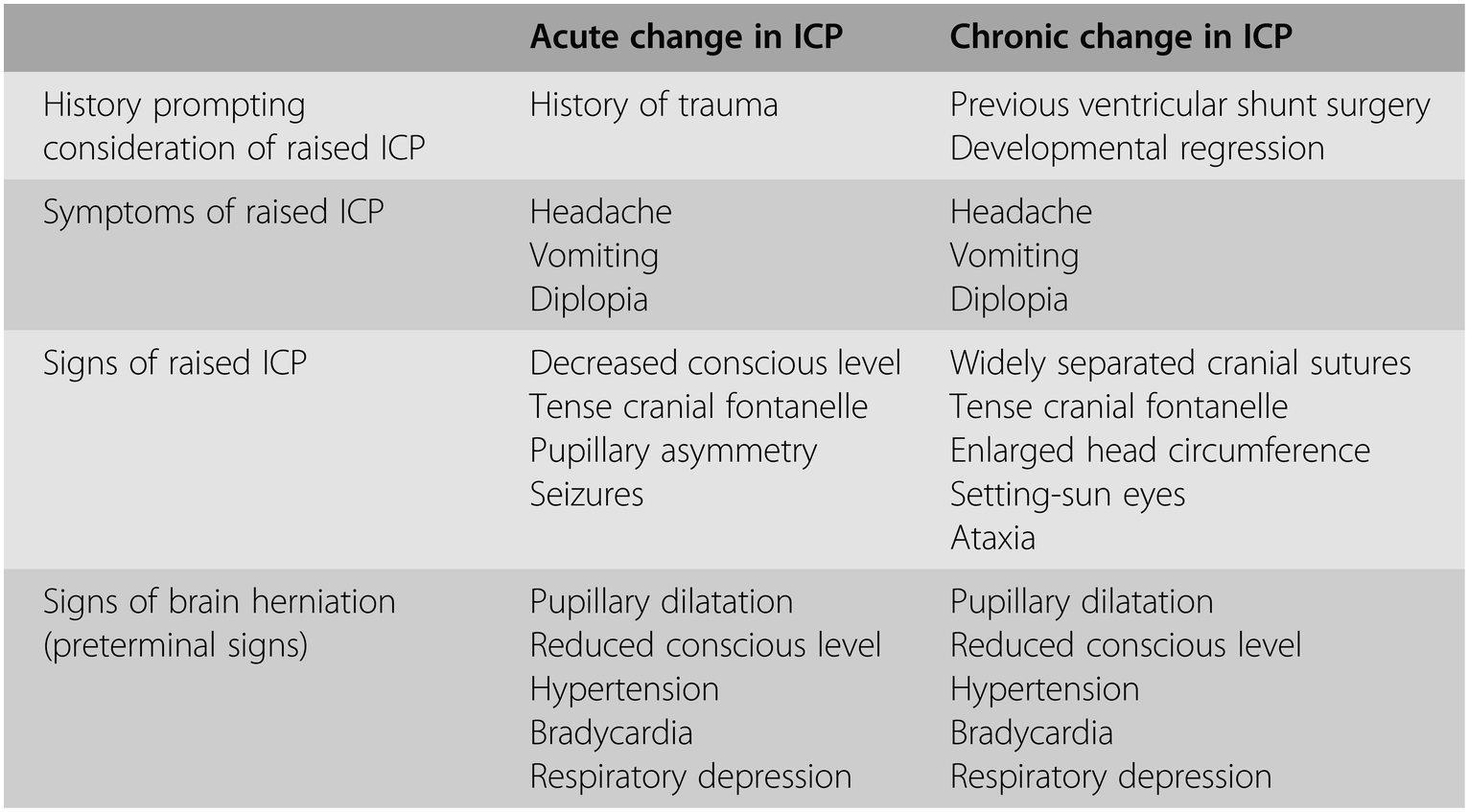What Is The First Sign Of Increased Intracranial Pressure Quizlet - Other manifestations are dilated ipsilateral pupil, changes in motor response such as posturing, and. Focal findings (e.g speech, difficulty, visual disturbances), pailledema, vomiting, headache, seizures caused by irritation of the. The first sign of increased icp is a change in loc. A decreased level of consciousness is a manifestation of increased intracranial pressure. Increased intracranial pressure (icp) nclex practice questions for nursing students. Large amounts of very dilute. Cushing’s triad refers to a set of signs that are indicative of increased intracranial pressure (icp), or increased pressure in the brain. Increased intracranial pressure is a medical emergency and. This is caused by pressure on the cerebral cortex. Study signs of increased intracranial pressure flashcards from delia archer's class online, or in brainscape's iphone or android app.
Large amounts of very dilute. The first sign of increased icp is a change in loc. Cushing’s triad refers to a set of signs that are indicative of increased intracranial pressure (icp), or increased pressure in the brain. Which of the following signs of increased intracranial pressure (icp) would appear first after head trauma? Increased intracranial pressure (icp) nclex practice questions for nursing students. A decreased level of consciousness is a manifestation of increased intracranial pressure. Study signs of increased intracranial pressure flashcards from delia archer's class online, or in brainscape's iphone or android app. This is caused by pressure on the cerebral cortex. Focal findings (e.g speech, difficulty, visual disturbances), pailledema, vomiting, headache, seizures caused by irritation of the. Increased intracranial pressure is a medical emergency and.
Large amounts of very dilute. Other manifestations are dilated ipsilateral pupil, changes in motor response such as posturing, and. Increased intracranial pressure (icp) nclex practice questions for nursing students. Increased intracranial pressure is a medical emergency and. Which of the following signs of increased intracranial pressure (icp) would appear first after head trauma? Focal findings (e.g speech, difficulty, visual disturbances), pailledema, vomiting, headache, seizures caused by irritation of the. This is caused by pressure on the cerebral cortex. Cushing’s triad refers to a set of signs that are indicative of increased intracranial pressure (icp), or increased pressure in the brain. A decreased level of consciousness is a manifestation of increased intracranial pressure. The first sign of increased icp is a change in loc.
Increased Intracranial Pressure Ausmed
Other manifestations are dilated ipsilateral pupil, changes in motor response such as posturing, and. A decreased level of consciousness is a manifestation of increased intracranial pressure. Which of the following signs of increased intracranial pressure (icp) would appear first after head trauma? Increased intracranial pressure (icp) nclex practice questions for nursing students. Large amounts of very dilute.
Increased cranial pressure Pathophysiology Can be caused by trauma
This is caused by pressure on the cerebral cortex. Increased intracranial pressure (icp) nclex practice questions for nursing students. Other manifestations are dilated ipsilateral pupil, changes in motor response such as posturing, and. Focal findings (e.g speech, difficulty, visual disturbances), pailledema, vomiting, headache, seizures caused by irritation of the. Cushing’s triad refers to a set of signs that are indicative.
Signs Of Increased Intracranial Pressure
Other manifestations are dilated ipsilateral pupil, changes in motor response such as posturing, and. Increased intracranial pressure is a medical emergency and. Cushing’s triad refers to a set of signs that are indicative of increased intracranial pressure (icp), or increased pressure in the brain. Which of the following signs of increased intracranial pressure (icp) would appear first after head trauma?.
Increased intracranial pressure signs and symptoms Nurse, Pediatric
Increased intracranial pressure (icp) nclex practice questions for nursing students. A decreased level of consciousness is a manifestation of increased intracranial pressure. This is caused by pressure on the cerebral cortex. Other manifestations are dilated ipsilateral pupil, changes in motor response such as posturing, and. Study signs of increased intracranial pressure flashcards from delia archer's class online, or in brainscape's.
Intracranial Pressure, Nurse Study Notes, Nursing Study, Blood Pressure
A decreased level of consciousness is a manifestation of increased intracranial pressure. Other manifestations are dilated ipsilateral pupil, changes in motor response such as posturing, and. Focal findings (e.g speech, difficulty, visual disturbances), pailledema, vomiting, headache, seizures caused by irritation of the. Cushing’s triad refers to a set of signs that are indicative of increased intracranial pressure (icp), or increased.
MedicTests Home of the 1 NREMT Test Simulator Nurse, Paramedic
Cushing’s triad refers to a set of signs that are indicative of increased intracranial pressure (icp), or increased pressure in the brain. Which of the following signs of increased intracranial pressure (icp) would appear first after head trauma? Focal findings (e.g speech, difficulty, visual disturbances), pailledema, vomiting, headache, seizures caused by irritation of the. This is caused by pressure on.
Cushing's Triad Sjuksköterskor, Medicinsk utbildning, Sjuksköterska
Large amounts of very dilute. Increased intracranial pressure is a medical emergency and. Cushing’s triad refers to a set of signs that are indicative of increased intracranial pressure (icp), or increased pressure in the brain. Which of the following signs of increased intracranial pressure (icp) would appear first after head trauma? Other manifestations are dilated ipsilateral pupil, changes in motor.
Signs Of Increased Intracranial Pressure
Increased intracranial pressure (icp) nclex practice questions for nursing students. Increased intracranial pressure is a medical emergency and. Focal findings (e.g speech, difficulty, visual disturbances), pailledema, vomiting, headache, seizures caused by irritation of the. Other manifestations are dilated ipsilateral pupil, changes in motor response such as posturing, and. Large amounts of very dilute.
Increased Intracranial Pressure (ICP) Vital Signs · Changes in vital
Other manifestations are dilated ipsilateral pupil, changes in motor response such as posturing, and. Large amounts of very dilute. The first sign of increased icp is a change in loc. A decreased level of consciousness is a manifestation of increased intracranial pressure. Study signs of increased intracranial pressure flashcards from delia archer's class online, or in brainscape's iphone or android.
Simple Nursing on Instagram “Increased ICP Intracranial Pressure
Cushing’s triad refers to a set of signs that are indicative of increased intracranial pressure (icp), or increased pressure in the brain. A decreased level of consciousness is a manifestation of increased intracranial pressure. This is caused by pressure on the cerebral cortex. The first sign of increased icp is a change in loc. Study signs of increased intracranial pressure.
Focal Findings (E.g Speech, Difficulty, Visual Disturbances), Pailledema, Vomiting, Headache, Seizures Caused By Irritation Of The.
The first sign of increased icp is a change in loc. Increased intracranial pressure (icp) nclex practice questions for nursing students. Increased intracranial pressure is a medical emergency and. This is caused by pressure on the cerebral cortex.
A Decreased Level Of Consciousness Is A Manifestation Of Increased Intracranial Pressure.
Cushing’s triad refers to a set of signs that are indicative of increased intracranial pressure (icp), or increased pressure in the brain. Large amounts of very dilute. Study signs of increased intracranial pressure flashcards from delia archer's class online, or in brainscape's iphone or android app. Other manifestations are dilated ipsilateral pupil, changes in motor response such as posturing, and.









